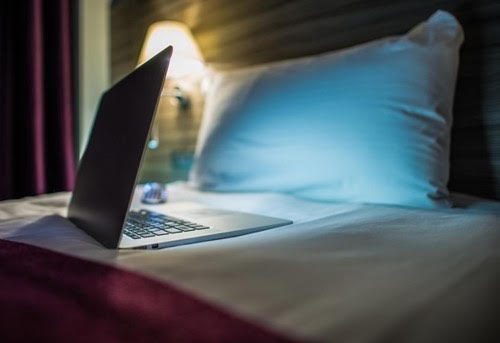Wellness: A Strict Bedtime Routine Following The Pandemic Is Crucial

Categories :
Experts have identified excessive screen time caused by the pandemic as a major issue for a poor sleep, based on findings from a brand-new study on national sleep quality.
- A national 76% increase in screen time during the pandemic is having a significant impact on sleep quality and routine, experts warn.
- Sleep scientists and psychologists urge Brits to combat disruptive light levels from technology, switch off from work and establish a healthy sleep routine.
- This follows findings that light exposure is one of the key factors behind poor sleep, with all parts of the UK vulnerable to disruptive artificial light pollution.
- Increased screen time stems from multi-screening, as remote workers now sit in front of the TV while working on laptops - doubling blue light exposure – alongside higher usage of mobiles and PCs for Facetime and Zoom calls with friends and family
Alert on excessive screen time
Increased use of mobiles and laptops to work and socialise could greatly impact restless Brits’ long-term productivity and restfulness. Studies show it takes around 23 minutes and 15 seconds to focus back on a task once you’ve been distracted by tech - including winding down for bed.
Brits are spending more time in front of multiple screens now than ever before - deemed multi-screening - as remote workers and students are now able to sit in front of TVs while simultaneously using a smartphone, laptop or tablet for work. Furthermore, with bars, restaurants and cinemas opening slowly and many closing early in the evening, many of us are still socialising digitally via Facetime, Zoom or Discord while playing games.
Artificial light - one of the reasons for a poor sleep
In fact, artificial light was found to be the most disruptive factor when trying to sleep, as high levels of light pollution disrupt essential sleep-wake cycles. According to the NHS, this can result in poor focus, impaired decision-making and an increased injury risk
This artificial light exposure is exacerbated by the increased screen time seen during the pandemic, and the associated higher blue light disruption. Latest figures showing that the average person picks up their phone 58 times per day - 48% of which take place outside of working hours.
This is a particular concern for young professionals and students, as excessive screen time is also linked to strained eyesight, reduced fitness levels, and increased anxiety.
The WakeUpWell study, conducted by Blinds Direct, analysed light pollution levels, sun hours and mean temperatures in key locations to establish which parts of England experience the lowest quality of sleep, and advises Brits on how they can combat it.
How to get back to a good night's sleep
Experts warn that it’s crucial for Brits to prioritise a strict sleep schedule when returning to the office, to avoid commuter fatigue and subsequent drops in productivity.
So, how can Brits increase their chances of getting a good night’s rest following this change in routine? Sleep scientists, coaches and psychologists weighed in, with their advice including that we:
- Establish and stick to a good sleep routine
- Reduce light exposure and limit screen time before bed3
- Prioritise switching off from work, and keeping professional and personal spaces separate where possible
Allana Wass, Certified Sleep Science Coach, says that establishing and sticking to a routine is paramount. She says: “Although it might be hard to go to bed and wake up at the same time, this is only at first. Once your body adjusts to a specific schedule, you won’t even have to catch up on sleep during the weekends.
“The thing is, sticking to a sleep schedule will allow your body to regulate its natural sleep and wake cycles easier. And with time, you will find it easier to fall asleep and wake up naturally.”
A strict bedtime routine
Katherine Hall, Sleep Psychologist, says that a strict work-from-home routine is crucial - particularly as Brits start returning to the office. She adds: “If you have been routinely waking up slightly later since working from home, you may find waking up slightly earlier more difficult.
“With more and more people working from home during the pandemic, the line between ‘work’ and ‘home’ has become a lot blurrier. This may have led to excessive time spent in front of your phone, delaying sleep and impacting sleep quality.”
For Alex Savy, Certified Sleep Science Coach, light levels are the most impactful factor on sleep, as he says: “To improve one’s sleep quality, you need to control light exposure. Try to get enough daylight by sitting near the window during work or taking walks whenever you can (even on a foggy day, it still might do you some good).
“Additionally, you might want to limit your screen time and, ideally, avoid taking devices to bed. You can use a blue light filter in the evening for extra protection and dim the lights around the house a couple of hours before bedtime.”
Solutions for avoiding light pollution
Following the findings that Central London was named the least well-rested area in England based on light exposure, as it reported an average brightness value of 70 - 65% higher light pollution levels than seen in the most rested city, Newcastle - experts weighed in.
Thomas Croft, HR Manager at Blinds Direct adds: “The study has made it evident that it’s not easy to get a good night’s sleep regardless of where you live or what you do for a living, as all cities and regions are exposed to high levels of light pollution.
“With an imminent return to pre-pandemic life, and people returning to work after a long period of working from home, it’s crucial that we prioritise our sleep schedule and ensure our homes are conducive to a high quality of sleep. Whether it’s by investing in blackout blinds, or a new mattress; or limiting screen time.”
#WakeUpWell challenge
Alongside the study, Blinds Direct has launched #WakeUpWell, a social media competition that will see one lucky winner receive a brand new set of blinds worth £400. Head over to their Facebook or Twitter page for more details.
To see the full results of the analysis, please visit the #WakeUpWell study here: https://www.blindsdirect.co.uk/wake-up-well
Citiesabc was created by a team of global industry leaders, academics and experts to create new solutions, resources, rankings and connections for the world’s top cities and populations.









